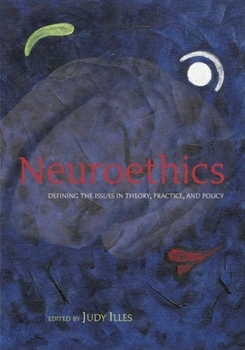Neuroethics: Defining the Issues in Theory, Practice and Policy
Select Format
Select Condition 
Book Overview
Recent advances in the brain sciences have dramatically improved our understanding of brain function. As we find out more and more about what makes us tick, we must stop and consider the ethical implications of this new found knowledge. Will having a new biology of the brain through imaging
make us less responsible for our behavior and lose our free will? Should certain brain scan studies be disallowed on the basis of moral grounds? Why is the media so interested in reporting results of brain imaging studies? What ethical lessons from the past can best inform the future of brain
imaging? These compelling questions and many more are tackled by a distinguished group of contributors to this, the first-ever volume on neuroethics. The wide range of disciplinary backgrounds that the authors represent, from neuroscience, bioethics and philosophy, to law, social and health care policy,
education, religion and film, allow for profoundly insightful and provocative answers to these questions, and open up the door to a host of new ones. The contributions highlight the timeliness of modern neuroethics today, and assure the longevity and importance of neuroethics for generations to
come.
make us less responsible for our behavior and lose our free will? Should certain brain scan studies be disallowed on the basis of moral grounds? Why is the media so interested in reporting results of brain imaging studies? What ethical lessons from the past can best inform the future of brain
imaging? These compelling questions and many more are tackled by a distinguished group of contributors to this, the first-ever volume on neuroethics. The wide range of disciplinary backgrounds that the authors represent, from neuroscience, bioethics and philosophy, to law, social and health care policy,
education, religion and film, allow for profoundly insightful and provocative answers to these questions, and open up the door to a host of new ones. The contributions highlight the timeliness of modern neuroethics today, and assure the longevity and importance of neuroethics for generations to
come.
Format:Paperback
Language:English
ISBN:0198567219
ISBN13:9780198567219
Release Date:December 2005
Publisher:Oxford University Press, USA
Length:346 Pages
Weight:1.35 lbs.
Dimensions:0.8" x 6.8" x 9.3"
Customer Reviews
1 rating
Introduction to the neuroscience of ethics and the ethics of neuroscience
Published by Thriftbooks.com User , 19 years ago
Interestingly it was William Safire, a former columnist of the New York Times, who coined the term 'neuroethics.' This he did in a conference in 2002, wherein he encouraged the participants to 'map the terrain of neuroethics.' This book, consisting of articles by some well-known researchers in cognitive neuroscience and neurophilosophy, outlines some of the major issues in neuroethics. All of the articles are very insightful, and introduce the reader to some of the main issues in neuroethics at the present time. Advances in neuroscience, like those in genomics, genetic engineering, and artificial intelligence, have caused great anxiety in some, due to their potential for abuse. Part of the field of neuroethics is concerned with the ethical considerations behind these advances, but part of it also deals with the explanation of ethical standards from a neuroscientific point of view. If a system of ethics is to be practical, it must be compatible with the processes in the brain and the actual decision-making capabilities of the brain. A study of how ethical considerations are processed by the brain will allow insight into the proper conduct of a human being, or at will at least give hints as to what direction to move in performing systematic constructions of ethical systems. This part of neuroethics thus deals with questions that have traditionally been in the realm of philosophy, but it shows promise in giving a scientific "foundation" for ethics. Every article in this book is extremely interesting, but the one by Patricia Smith Churchland which begins the book is the most interesting of those in the book, at least in the opinion of this reviewer. She clearly believes that the increased understanding of the brain obtained in the last few decades reveals that ethical standards and rules have their origin in human neurobiology. This belief may raise the ire of many in religious circles, but 'naturalized ethics', as she calls it, has its foundation in biology, and not in collections of rules or maxims having no immediate or long-term survival value. Neuroethics is a more practical approach to moral decision making, and is to be differentiated from the rule-based ethics of the world's religions or governmental bureaucracies. Such a system of ethics will respect the causal nature of the brain, and will not expect individuals to alter their belief structures or change their behavior automatically when they are confronted with new ideas or experiences. The reward system of the brain in social learning, the author remarks, encourages respect for existing social institutions and therefore it is sometimes difficult for individuals to challenge these institutions and the ideas they stand for. In this context it is interesting to observe that political conservatism holds as one of its major tenets respect for institutions and hierarchies, and a strong repugnance to change. But as the author notes, revolutions do occur, and the changes that take place can





